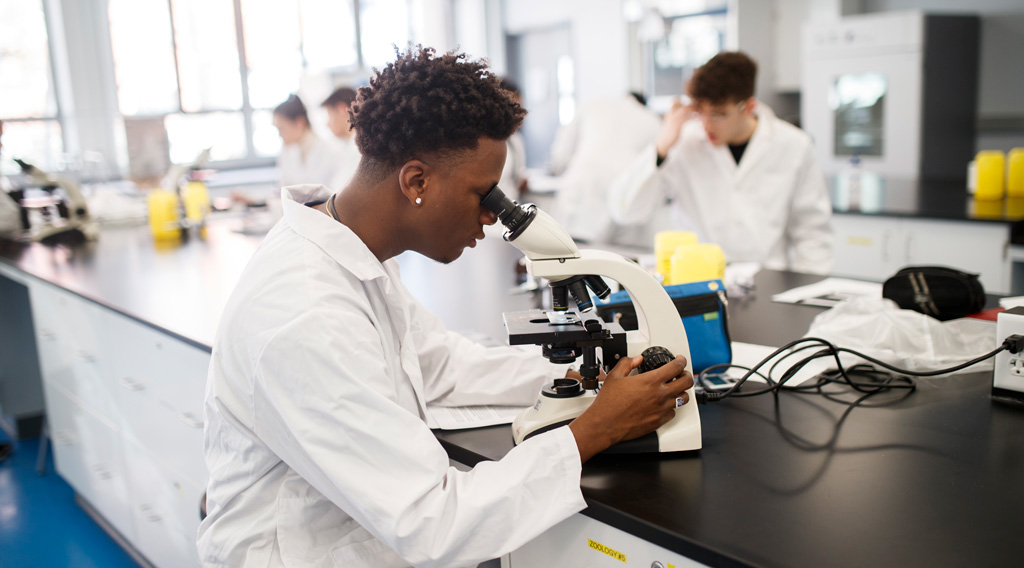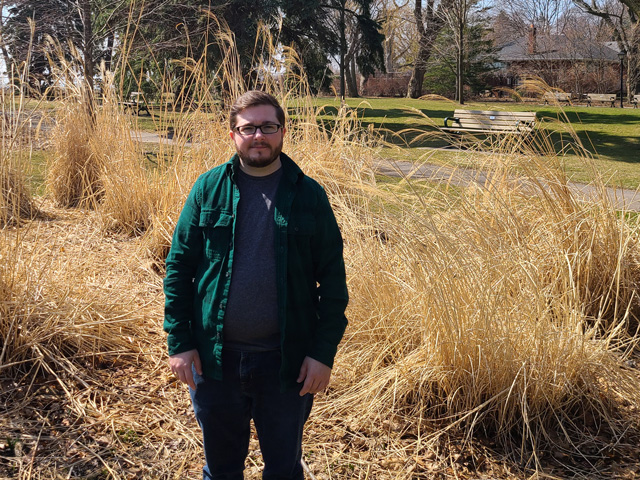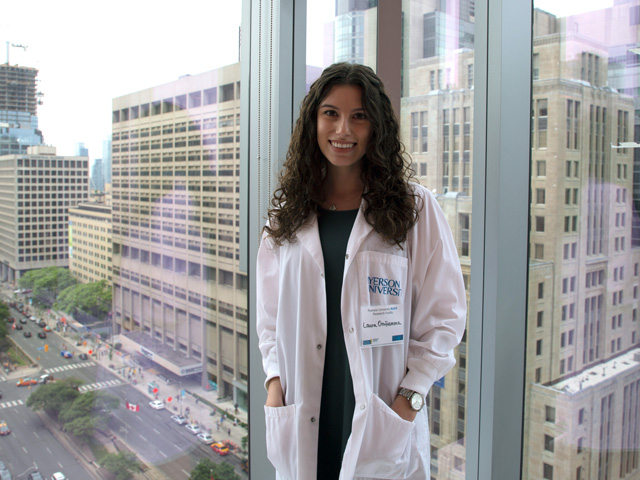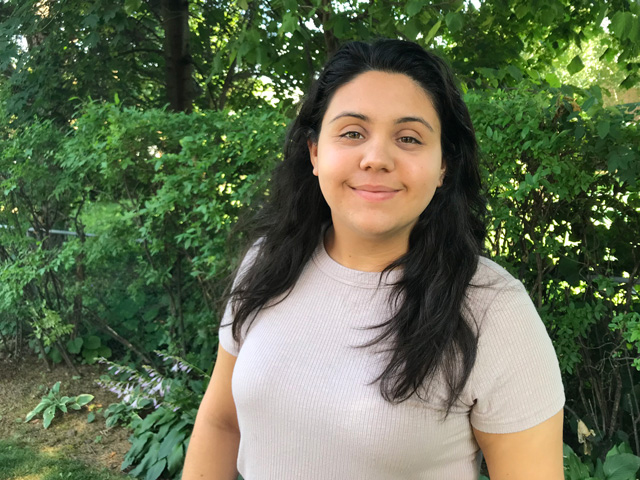Program Overview

Thanks for your interest in studying science at Toronto Metropolitan University. Within the Department of Chemistry and Biology, we offer three undergraduate programs. All of them are a great first step towards a very wide range of possible career paths in science or its related fields.
You’ll gain both theoretical knowledge and applied skills, with many opportunities to experience authentic scientific research — as it happens in real world labs. Some students have worked with professors on cutting edge topics, such as the body’s response to cancer and disease, drug development and antibiotic resistance in the environment.
Quick Facts
Degree Earned: BSc (Honours)
Program Length: Four years, full time
Co-op Available? Yes. Five-years, full time
Tip
Common Point of Entry: Chemistry and Biology students share the same first-year curriculum with students in Medical Physics. This allows students in these programs to explore various possible paths before committing to a single program.
Biology Program

If you’re passionate about the planet and living organisms, the Biology program may be right for you. You’ll develop a solid foundation in this very broad area of science, which ranges from understanding the intricate workings of cells to how large ecosystems adapt to environmental change. You’ll study subjects such as ecology, microbiology, botany, biochemistry, genetics, and more.
Three Options:
In addition to the regular curriculum, the Biology program also offers three options, which include required courses in third and fourth years.
- Biophysics Option: Typically studied in graduate school, this field applies physics theories and methods to biological questions, often related to disease and medicine.
- Bioinformatics and Computational Biology Option: These two fields use techniques of computer science, applied mathematics and statistics to solve biology-inspired problems
- Environmental Biology Option: This interdisciplinary field combines chemistry, engineering and other pertinent fields to explore problems in conservation and ecology.
What you’ll study during the program
Common First Two Years: All students in Biology share the same course load in the first two years. Through required core courses, you’ll build a broad foundation in science. You’ll also reinforce your mathematics skills, learn how computers are used as scientific tools, and broaden your education with an elective course in liberal studies.
In second year, you’ll start exploring various fields of biology, such as ecology, microbiology, genetics, zoology and more.
Upper Years: In years three and four, you’ll gain technical expertise in science through more advanced courses, and also explore the many applications for biology in the real world. If you choose one of the three curriculum Options, you’ll take required courses in those fields. In fourth year, you’ll work on an independent thesis project on a specialty topic, under the supervision of a professor.

“At [TMU], I had the opportunity to participate in meaningful, hands-on research, including synthesizing novel porphyrin molecules and investigating the effects of plant metabolites on water flea behaviour. I will become a better scientist for the experiences and connections I’ve made here.”
– Alex Rimmer, BSc ’20 (Biology)
Biomedical Sciences Program

In this specialized program, you’ll gain understanding in biological processes and how they relate to health, infection and the development of disease states. Biomedical science is a quickly growing field in which the ultimate goal is to develop effective treatments and cures. You’ll study biochemistry, cell biology, genetics, physiology and other topics that are important for medical research, and the biotechnology and pharmaceutical industries.
What you’ll study during the program
Common First Two Years: All students in Biomedical Sciences share the same course load in the first two years. In year one, you’ll study the fundamentals of science and math. In second year, you’ll look more closely into cell biology, microbiology, biochemistry and biomedical science courses— cornerstone areas of the biomedical sciences, and a foundation you’ll need for specialized upper-year courses. To round out your education, both years allow you to choose electives in courses outside of natural sciences.
Upper Years: You’ll start exploring deeper, specialized topics in biomedical sciences, including core courses in advanced biochemistry, molecular biology and immunology. A selection of electives will let you gain either greater depth of knowledge in a single area and/or develop multi-disciplinary knowledge in several areas. Exclusive to Biomedical Science students, you’ll also take innovative courses in experimental design and critical thinking, which will train you to think about why science is carried out a certain way, and how to design science going forward.

“The Biomedical Sciences program has so many opportunities for collaboration and learning, and there’s so much support. The professors fostered my curiosity for research, and I’ve had the chance to investigate how a cell's metabolism can become dysregulated in cancer.”
– Laura Orofiamma, BSc ‘19 (Biomedical Sciences)
Chemistry Program

If you’re interested in how matter and energy work together to create new materials, protect the environment or fight disease, the Chemistry program can open the doors to all kinds of career paths. Our program is strongly applications-oriented. Much of your learning will take place in the laboratory. You’ll gain theoretical knowledge and solid understanding of the principles of chemical science.
Applied Physics option
In addition to the regular curriculum, we also offer an Applied Physics option. The curriculum emphasizes physical chemistry as an interdisciplinary approach to areas of physics, such as solid state physics, biophysics, radiation biology or medical diagnostic techniques.
Accredited by the Canadian Society for Chemistry (CSC)
Both our regular and co-op programs meet high quality, national standards, providing our Chemistry graduates with a firm foundation to build a career in chemical sciences and register with provincial professional associations.
What you’ll study during the program
Common First Year: Students in Chemistry share the same point of entry with programs in Biology and Medical Physics. You’ll build a foundation in the fundamentals of science. You’ll also reinforce your mathematics skills, and learn how computers are used as scientific tools.
Second & Third Years: Starting in second year, you’ll start to develop technological expertise, spending a significant portion of your time in the laboratory. You’ll also explore the research and industrial applications of chemical science. If you enrolled in the Applied Physics option, you’ll begin to take specialized, required courses in this area. Throughout the program, you’ll also select professional electives in specialty areas of chemistry, as well as elective courses in liberal studies to broaden your education outside of natural sciences.
Final Year: In fourth year, you will continue with extensive lab work. You may also qualify for and opt to undertake an independent thesis project, in which you’ll work on a specialized topic under the supervision of a professor.

“[TMU] has given me such a meaningful science experience. I’ve grown so much as a student and scientist. I’ve had many opportunities to immerse myself in research projects. I can’t wait for what my next two years in the Molecular Science master’s program will bring.”
– Melissa D’Amaral, BSc ’20 (Chemistry)